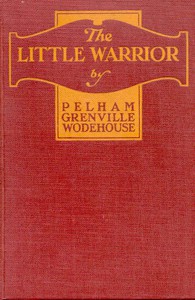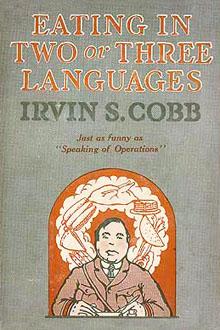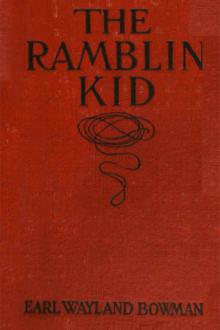The Little Warrior, P. G. Wodehouse [robert munsch read aloud txt] 📗

- Author: P. G. Wodehouse
Book online «The Little Warrior, P. G. Wodehouse [robert munsch read aloud txt] 📗». Author P. G. Wodehouse
For a moment he was so near to her that, but for the closed window, she could have touched him. Then the polar-bear at the wheel, noting a gap in the traffic, stepped on the accelerator and slipped neatly through. The car moved swiftly on and disappeared.
Jill drew a deep breath. The Stop-and-Go sign swung round again. She crossed the avenue, and set out once more to find Nelly Bryant. It occurred to her, five minutes later, that a really practical and quick-thinking girl would have noted the number of the limousine.
The rehearsals of a musical comedy—a term which embraces “musical fantasies”—generally begin in a desultory sort of way at that curious building, Bryant Hall, on Sixth Avenue just off Forty-second Street. There, in a dusty, uncarpeted room, simply furnished with a few wooden chairs and some long wooden benches, the chorus—or, in the case of “The Rose of America,” the ensemble—sit round a piano and endeavor, with the assistance of the musical director, to get the words and melodies of the first-act numbers into their heads. This done, they are ready for the dance director to instil into them the steps, the groupings, and the business for the encores, of which that incurable optimist always seems to expect there will be at least six. Later, the principals are injected into the numbers. And finally, leaving Bryant Hall and dodging about from one unoccupied theatre to another, principals and chorus rehearse together, running through the entire piece over and over again till the opening night of the preliminary road tour.
To Jill, in the early stages, rehearsing was just like being back at school. She could remember her first school-mistress, whom the musical director somewhat resembled in manner and appearance, hammering out hymns on a piano and leading in a weak soprano an eager, baying pack of children, each anxious from motives of pride to out-bawl her nearest neighbor.
The proceedings began on the first morning with the entrance of Mr Saltzburg, the musical director, a brisk, busy little man with benevolent eyes behind big spectacles, who bustled over to the piano, sat down, and played a loud chord, designed to act as a sort of bugle blast, rallying the ladies of the ensemble from the corners where they sat in groups, chatting. For the process of making one another’s acquaintance had begun some ten minutes before with mutual recognitions between those who knew each other from having been together in previous productions. There followed rapid introductions of friends. Nelly Bryant had been welcomed warmly by a pretty girl with red hair, whom she introduced to Jill as Babe: Babe had a willowy blonde friend, named Lois: and the four of them had seated themselves on one of the benches and opened a conversation; their numbers being added to a moment later by a dark girl with a Southern accent and another blonde. Elsewhere other groups had formed, and the room was filled with a noise like the chattering of starlings. In a body by themselves, rather forlorn and neglected, half a dozen solemn and immaculately dressed young men were propping themselves up against the wall and looking on, like men in a ball-room who do not dance.
Jill listened to the conversation without taking any great part in it herself. She felt as she had done on her first day at school, a little shy and desirous of effacing herself. The talk dealt with clothes, men, and the show business, in that order of importance. Presently one of the young men sauntered diffidently across the room and added himself to the group with the remark that it was a fine day. He was received a little grudgingly, Jill thought, but by degrees succeeded in assimilating himself. A second young man drifted up; reminded the willowy girl that they had worked together in the western company of “You’re the One”; was recognized and introduced; and justified his admission to the circle by a creditable imitation of a cat-fight. Five minutes later he was addressing the Southern girl as “honey,” and had informed Jill that he had only joined this show to fill in before opening on the three-a-day with the swellest little song-and-dance act which he and a little girl who worked in the cabaret at Geisenheimer’s had fixed up.
On this scene of harmony and good-fellowship Mr Saltzburg’s chord intruded jarringly. There was a general movement, and chairs and benches were dragged to the piano. Mr Saltzburg causing a momentary delay by opening a large brown music-bag and digging in it like a terrier at a rat-hole, conversation broke out again.
Mr Saltzburg emerged from the bag, with his hands full of papers, protesting.
“Childrun! Chil-drun! If you please, less noise and attend to me!” He distributed sheets of paper. “Act One, Opening Chorus. I will play the melody three—four times. Follow attentively. Then we will sing it la-la-la, and after that we will sing the words. So!”
He struck the yellow-keyed piano a vicious blow, producing a tinny and complaining sound. Bending forward with his spectacles almost touching the music, he plodded determinedly through the tune, then encored himself, and after that encored himself again. When he had done this, he removed his spectacles and wiped them. There was a pause.
“Izzy,” observed the willowy young lady chattily, leaning across Jill and addressing the Southern girl’s blonde friend, “has promised me a sunburst!”
A general stir of interest and a coming close together of heads.
“What! Izzy!”
“Sure, Izzy.”
“Well!”
“He’s just landed the hat-check privilege at the St Aurea!”
“You don’t say!”
“He told me so last night and promised me the sunburst. He was,” admitted the willowy girl regretfully, “a good bit tanked at the time, but I guess he’ll make good.” She mused awhile, a rather anxious expression clouding her perfect profile. She looked like a meditative Greek Goddess. “If he doesn’t,” she added with maidenly dignity, “it’s the las’ time I go out with the big stiff. I’d tie a can to him quicker’n look at him!”
A murmur of approval greeted this admirable sentiment.
“Childrun!” protested Mr Saltzburg. “Chil-drun! Less noise and chatter of conversation. We are here to work! We must not waste time! So! Act One, Opening Chorus. Now, all together. La-la-la …”
“La-la-la …”
“Tum-tum-tumty-tumty …”
“Tum-tum-tumty …”
Mr Saltzburg pressed his hands to his ears in a spasm of pain.
“No, no, no! Sour! Sour! Sour!… Once again. La-la-la …”
A round-faced girl with golden hair and the face of a wondering cherub interrupted, speaking with a lisp.
“Mithter Thalzburg.”
“Now what is it, Miss Trevor?”
“What sort of a show is this?”
“A musical show,” said Mr Saltzburg severely, “and this is a rehearsal of it, not a conversazione. Once more, please …”
The cherub was not to be rebuffed.
“Is the music good, Mithter Thalzburg?”
“When you have rehearsed it, you shall judge for yourself. Come, now …”
“Is there anything in it as good as that waltz of yours you played us when we were rehearthing ‘Mind How You Go?’ You remember. The one that went …”
A tall and stately girl, with sleepy brown eyes and the air of a duchess in the servants’ hall, bent forward and took a kindly interest in the conversation.
“Oh, have you composed a varlse, Mr Saltzburg?” she asked with pleasant condescension. “How interesting, really! Won’t you play it for us?”
The sentiment of the meeting seemed to be unanimous in favor of shelving work and listening to Mr Saltzburg’s waltz.
“Oh, Mr Saltzburg, do!”
“Please!”
“Some one told me it was a pipterino!”
“I cert’nly do love waltzes!”
“Please, Mr Saltzburg!”
Mr Saltzburg obviously weakened. His fingers touched the keys irresolutely.
“But, childrun!”
“I am sure it would be a great pleasure to all of us,” said the duchess graciously, “if you would play it. There is nothing I enjoy more than a good varlse.”
Mr Saltzburg capitulated. Like all musical directors he had in his leisure moments composed the complete score of a musical play and spent much of his time waylaying librettists on the Rialto and trying to lure them to his apartment to listen to it, with a view to business. The eternal tragedy of a musical director’s life is comparable only to that of the waiter who, himself fasting, has to assist others to eat, Mr Saltzburg had lofty ideas on music, and his soul revolted at being compelled perpetually to rehearse and direct the inferior compositions of other men. Far less persuasion than he had received today was usually required to induce him to play the whole of his score.
“You wish it?” he said. “Well, then! This waltz, you will understand, is the theme of a musical romance which I have composed. It will be sung once in the first act by the heroine, then in the second act as a duet for heroine and hero. I weave it into the finale of the second act, and we have an echo of it, sung off stage, in the third act. What I play you now is the second-act duet. The verse is longer. So! The male voice begins.”
A pleasant time was had by all for ten minutes.
“Ah, but this is not rehearsing, childrun!” cried Mr Saltzburg remorsefully at the end of that period. “This is not business. Come now, the opening chorus of act one, and please this time keep on the key. Before, it was sour, sour. Come! La-la-la …”
“Mr Thalzburg!”
“Miss Trevor?”
“There was an awfully thweet fox-trot you used to play us. I do wish …”
“Some other time, some other time! Now we must work. Come! La-la-la …”
“I wish you could have heard it, girls,” said the cherub regretfully. “Honetht, it wath a lalapalootha!”
The pack broke into full cry.
“Oh, Mr Saltzburg!”
“Please, Mr Saltzburg!”
“Do play the fox-trot, Mr Saltzburg!”
“If it is as good as the varlse,” said the duchess, stooping once more to the common level, “I am sure it must be very good indeed.” She powdered her nose. “And one so rarely hears musicianly music nowadays, does one?”
“Which fox-trot?” asked Mr Saltzburg weakly.
“Play ’em all!” decided a voice on the left.
“Yes, play ’em all,” bayed the pack.
“I am sure that that would be charming,” agreed the duchess, replacing her powder-puff.
Mr Saltzburg played ’em all. This man by now seemed entirely lost to shame. The precious minutes that belonged to his employers and should have been earmarked for “The Rose of America” flitted by. The ladies and gentlemen of the ensemble, who should have been absorbing and learning to deliver the melodies of Roland Trevis and the lyrics of Otis Pilkington, lolled back in their seats. The yellow-keyed piano rocked beneath an unprecedented onslaught. The proceedings had begun to resemble not so much a rehearsal as a home evening, and grateful glances were cast at the complacent cherub. She had, it was felt, shown tact and discretion.
Pleasant conversation began again.
“… And I walked a couple of blocks, and there was exactly the same model in Schwartz and Gulderstein’s window at twenty-six fifty …”
“… He got on at Forty-second Street, and he was kinda fresh from the start. I could see he was carrying a package. At Sixty-sixth he came sasshaying right down the car and said ‘Hello, patootie!’ Well, I drew myself up …”
“… ‘Even if you are my sister’s husband,’ I said to him. Oh, I suppose I got a temper. It takes a lot to arouse it, y’know, but I c’n get pretty mad …”
“… You don’t know the half of it, dearie, you don’t know the half of it! A one-piece bathing suit! Well, you could call it that, but the cop on the beach said it was more like a baby’s sock. And when …”
“… So I said ‘Listen, Izzy, that’ll be about all from you! My father was a gentleman, though I don’t suppose you know what that means, and I’m not accustomed …’”
“Hey!”
A voice from the neighborhood of the door had cut into the babble like a knife into butter; a rough, rasping voice, loud and compelling, which caused the conversation of the members of the ensemble to cease on the instant. Only Mr Saltzburg, now in a perfect frenzy of musicianly fervor, continued to assault the decrepit piano, unwitting of an unsympathetic addition to his audience.
“What I play you now is the laughing trio from my second act. It is a building number.





Comments (0)